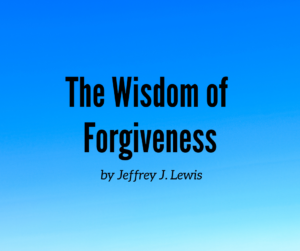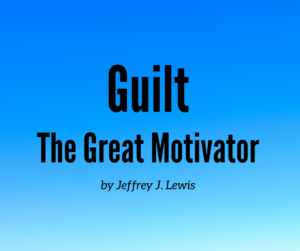
The Wisdom of Forgiveness
I don’t think there’s anyone on the planet that never experienced an injustice from someone else. It could have happened to you as a child, teen or adult. It may have come from a parent, sibling, teacher, friend, spouse, or even a perfect stranger. The source of that injustice is irrelevant, but in some way, something or someone offended you on a deep level and you’re still hurting from it, perhaps years or even decades later.
The old saying that “Time heals all wounds”, is false. Time doesn’t heal anything… it just puts you at a chronological distance from the experience. Although time can help to reduce some of the effects, you may still feel wounded and violated. You may have anger, resentment, thoughts of vengeance, bitterness, and even hatred. And unfortunately, none of these are doing you one bit of good.
Of all the emotions that we feel when we’ve experienced an injustice from someone else, anger appears to be at the top of the list. Anger is caused when a boundary you have has been violated. A boundary is a belief, or an idea, and it’s very personal. We all have such boundaries, and for good reason; they give us a feeling of safety. Unfortunately, there’s a dark side to holding on to a belief or idea that expresses itself as anger.
Anger affects us both mentally and physically. It keeps us locked into a perpetual state of fight or flight. Our breathing gets shallow, our heartrate and blood pressure go up, and worst of all, our immune system goes down. This leaves us in a constant state of vulnerability to viral and bacterial infections, and can even lead to the development of autoimmune diseases. So as you can see, holding on to anger can have very serious side effects. But what can we do about it?
The Wisdom of forgiveness
First of all, realize that anger in itself, is not a bad emotion… it serves a positive purpose. Ideally, it protects us from a repeat of the violation that made us angry in the first place. Sometimes it works, sometimes it doesn’t, but its intentions are always positive. But the key here is to realize that emotions are responses to thoughts and beliefs. So the “trick” is to figure out what belief got violated. If you modify the belief, you’ll change the emotional response.
For example, suppose you needed something from the hardware store, perhaps a new 50-foot extension cord for your electric hedge trimmer. You’ve been planning to trim your hedges and tomorrow’s the big day. Just to make sure you were ready to go in the morning, you went to test your trimmer and discovered that you didn’t have a long extension cord. You’re a little bummed out but no big deal, you can get a new one in the morning.
So, the next morning, bright and early (around 8:00 a.m.) you head to the hardware store. When you get there, you find that the store doesn’t open until 9:00! Now you’re frustrated and a bit angry. Your plans are made, and now you have to sit and wait for an hour! As you can see, your belief that they opened at 8:00 was violated, and that triggered the emotional response of anger.
But what if you’d called the store yesterday to find out what time they opened? You may have been disappointed because you wanted to get an earlier start on your project, but you wouldn’t really be angry. You’d be at the store at 9:00 and still have plenty of time to do your trimming. No problem… and no anger. The next time you need something from that store, you’ll know when they open. Or you’ll look for a different store that does open earlier.
The Wisdom of forgiveness
Let’s look at another example that will be a little heavier. You and a very close friend have been planning to take a trip together. And just for the novelty of it, you decided to go by train. Your reservations have been made and the big day finally arrives. You get to the train station precisely one hour before your scheduled departure time. A half hour later your friend isn’t there yet. You’re getting anxious because your friend is usually very prompt.
Ten minutes later and still your friend hasn’t shown and you’re getting anxious. Another 10 minutes later you retrieve your luggage from the train and start driving home. You’ve tried to call your friend at least a dozen times in the last hour. No answer. “Well he could have at least called” you think to yourself. Now you’re angry. As you’re driving home you get a phone call from one of your friend’s family members. Turns out that while on his way to the station, your friend was in a serious car wreck and is in critical condition. Now where’s your anger?
This new information has completely transformed your belief about why he hadn’t arrived at the train station on time. Without your former belief implying that he had in some way stood you up, you have no basis for being angry.
But now, what if you had a different situation where someone physically abused you? Possibly many times. Coming up with a simple excuse or justification for it is not so easily done. The abuse could have happened yesterday, or 30 years ago, but your emotions about it haven’t diminished one bit. How you choose to deal with something like this can either lock you into a life of misery, or motivate you to learn, grow, and move on. The critical course of action involved an such a situation, is learning how to forgive.
Forgiveness is for YOU… not them.
To forgive someone who hurt you deeply is not saying that their actions were right or justifiable. Forgiveness is not about them… it’s about you. Let me repeat that: Forgiveness is not about them… it’s about you. The act of forgiveness takes place in our own mind and heart; it really has nothing to do with the other person. Forgiving someone has absolutely nothing to do with you apologizing for anything. Forgiveness is a choice. Physically speaking, carrying anything can wear you down – even carrying a grudge.
To forgive someone doesn’t mean that you have to make up and be friends. It doesn’t require that you even let them know that you forgive them. It doesn’t require you to ever see or speak with them again. You don’t forgive someone for their benefit, you forgive them for your own benefit. If that sounds selfish, so be it. There are times when we MUST be selfish for our own physical and/or emotional health and wellbeing.
The Wisdom of Forgiveness
Here are a few suggestions to consider that can help you to forgive:
- Forgiveness is about you… not the one who offended you.
- You can’t move forward until you let go of the past.
- Forgiveness can be a process. Take it 1 step at a time, 1 day at a time.
- You don’t have to forget – in order to forgive. Besides, forgetting is impossible to do, short of having a brain injury.
- No one is perfect.
- In what way(s) are you a better person because of your bad experience?
- The act of forgiving allows you to truly be happy once again.
In the Buddhist philosophy they speak of a concept called “non-attachment”. Non-attachment means to not allow our past to control our present. It also means to not be attached to our own everyday expectations of how people or things “should” be. They simply are. Letting go of expectations is very liberating. There’s a lot of freedom and wisdom that comes from looking at difficult experiences from this perspective. Changing the way we look at things – especially the “bad” experiences – is the single most powerful action we can take. In addition, it makes it a lot easier to forgive. Choose the high road. Do it for your own benefit… not someone else’s.
